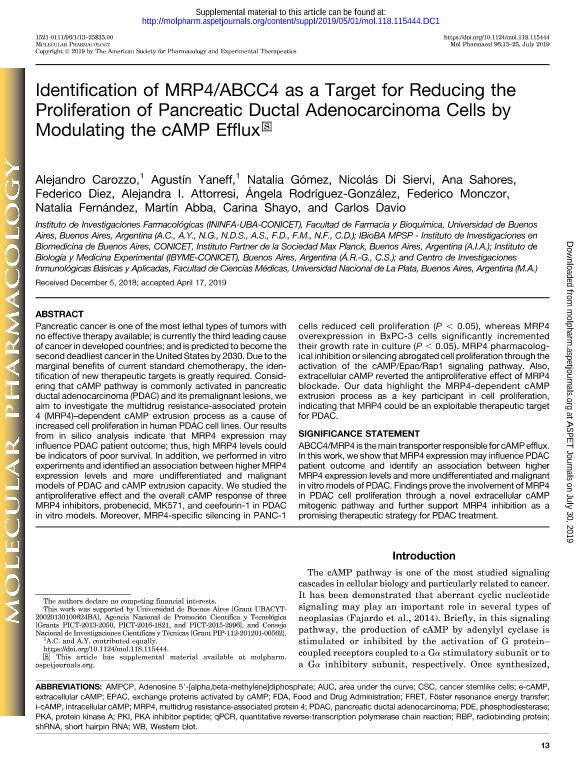Artículo
Identification of MRP4/ABCC4 as a target for reducing the proliferation of pancreatic ductal adenocarcinoma cells by modulating the cAMP efflux
Carozzo, Alejandro Enrique ; Yaneff, Agustín
; Yaneff, Agustín ; Gomez, Natalia
; Gomez, Natalia ; Di Siervi, Nicolás
; Di Siervi, Nicolás ; Sahores, Ana
; Sahores, Ana ; Diez, Federico Ruben
; Diez, Federico Ruben ; Attorresi, Alejandra Inés
; Attorresi, Alejandra Inés ; Rodriguez Gonzalez, Angela Paola
; Rodriguez Gonzalez, Angela Paola ; Monczor, Federico
; Monczor, Federico ; Fernandez, Natalia Cristina
; Fernandez, Natalia Cristina ; Abba, Martín Carlos
; Abba, Martín Carlos ; Shayo, Carina Claudia
; Shayo, Carina Claudia ; Davio, Carlos Alberto
; Davio, Carlos Alberto
 ; Yaneff, Agustín
; Yaneff, Agustín ; Gomez, Natalia
; Gomez, Natalia ; Di Siervi, Nicolás
; Di Siervi, Nicolás ; Sahores, Ana
; Sahores, Ana ; Diez, Federico Ruben
; Diez, Federico Ruben ; Attorresi, Alejandra Inés
; Attorresi, Alejandra Inés ; Rodriguez Gonzalez, Angela Paola
; Rodriguez Gonzalez, Angela Paola ; Monczor, Federico
; Monczor, Federico ; Fernandez, Natalia Cristina
; Fernandez, Natalia Cristina ; Abba, Martín Carlos
; Abba, Martín Carlos ; Shayo, Carina Claudia
; Shayo, Carina Claudia ; Davio, Carlos Alberto
; Davio, Carlos Alberto
Fecha de publicación:
07/2019
Editorial:
American Society for Pharmacology and Experimental Therapeutics
Revista:
Molecular Pharmacology
ISSN:
0026-895X
Idioma:
Inglés
Tipo de recurso:
Artículo publicado
Clasificación temática:
Resumen
Pancreatic cancer is one of the most lethal types of tumors with no effective therapy available; is currently the third leading cause of cancer in developed countries; and is predicted to become the second deadliest cancer in the United States by 2030. Due to the marginal benefits of current standard chemotherapy, the identification of new therapeutic targets is greatly required. Considering that cAMP pathway is commonly activated in pancreatic ductal adenocarcinoma (PDAC) and its premalignant lesions, we aim to investigate the multidrug resistance-associated protein 4 (MRP4)-dependent cAMP extrusion process as a cause of increased cell proliferation in human PDAC cell lines. Our results from in silico analysis indicate that MRP4 expression may influence PDAC patient outcome; thus, high MRP4 levels could be indicators of poor survival. In addition, we performed in vitro experiments and identified an association between higher MRP4 expression levels and more undifferentiated and malignant models of PDAC and cAMP extrusion capacity. We studied the antiproliferative effect and the overall cAMP response of three MRP4 inhibitors, probenecid, MK571, and ceefourin-1 in PDAC in vitro models. Moreover, MRP4-specific silencing in PANC-1 cells reduced cell proliferation (P, 0.05), whereas MRP4 overexpression in BxPC-3 cells significantly incremented their growth rate in culture (P, 0.05). MRP4 pharmacological inhibition or silencing abrogated cell proliferation through the activation of the cAMP/Epac/Rap1 signaling pathway. Also, extracellular cAMP reverted the antiproliferative effect of MRP4 blockade. Our data highlight the MRP4-dependent cAMP extrusion process as a key participant in cell proliferation, indicating that MRP4 could be an exploitable therapeutic target for PDAC.
Palabras clave:
MRP4/ABCC4
,
PANCREATIC
,
DUCTAL
,
ADENOCARCINOMA
,
CAMP
Archivos asociados
Licencia
Identificadores
Colecciones
Articulos(IBIOBA - MPSP)
Articulos de INST. D/INV.EN BIOMED.DE BS AS-CONICET-INST. PARTNER SOCIEDAD MAX PLANCK
Articulos de INST. D/INV.EN BIOMED.DE BS AS-CONICET-INST. PARTNER SOCIEDAD MAX PLANCK
Articulos(IBYME)
Articulos de INST.DE BIOLOGIA Y MEDICINA EXPERIMENTAL (I)
Articulos de INST.DE BIOLOGIA Y MEDICINA EXPERIMENTAL (I)
Articulos(ININFA)
Articulos de INST.DE INVEST.FARMACOLOGICAS (I)
Articulos de INST.DE INVEST.FARMACOLOGICAS (I)
Citación
Carozzo, Alejandro Enrique; Yaneff, Agustín; Gomez, Natalia; Di Siervi, Nicolás; Sahores, Ana; et al.; Identification of MRP4/ABCC4 as a target for reducing the proliferation of pancreatic ductal adenocarcinoma cells by modulating the cAMP efflux; American Society for Pharmacology and Experimental Therapeutics; Molecular Pharmacology; 96; 1; 7-2019; 13-25
Compartir
Altmétricas



